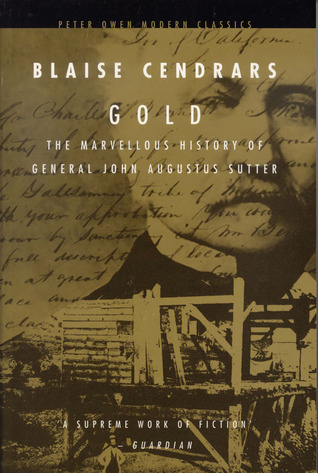According to the back of Blaise Cendrars’ Gold (1924), the author spent fifteen years creating this, a fictionalised account of John Augustus Sutter – his debut novel. Given how slim the book is, one supposes that period wasn’t completely absorbed by this one endeavour. But, regardless, it was time well spent as Gold is a wonderful piece of fiction taking reams of fact and – as far as my understanding of the reported history goes – smudging it with a series of taken liberties.
At the age of thirty-one, the Swiss Johan August Suter (“bankrupt, fugitive, vagabond, thief and swindler”) has many debtors and, rather than pay them off, leaves his family – a wife, three young children – and heads for America, becoming John Augustus Sutter, to make his fortune. He departs from France and arrives drunk and excited in New York running “off into the great, unknown city, as if he were in a hurry and someone was expecting him.”
In New York Sutter works west trying his hand at an extensive number of trades (from draper’s assistant to drugstore clerk; from circus groom to sideshow boxer) and accrues enough cash to open a saloon on the western side of the city where he can keep an ear on:
“what kinds of business are carried on there, and which ones are creating the prodigious fortunes that are building up this city…of the progress of those slow caravans of wagons that cross the vast plains of the Middle West…of plans of conquest and exploration even before the government gets to hear of them.”
When the time is right, Sutter (“a man of action”) sells up and heads west. And why not? Especially when:
There are Indian legends that tell of an enchanted country where the towns are built of gold and the women have but a single breast. Even the trappers who come down from the North with their cargoes of furs have heard, in their remote latitudes, tales of this wondrous country of the West where, they say, the fruit is made of gold and silver.
After a lengthy journey, comprising land and sea, Sutter eventually comes to California, then under Mexican rule. Granted land for taking Mexican nationality he builds upon this by buying out further expanses from the departing Russians until he has, in his power, an army of workers and an agricultural wonderland producing vines, crops, and livestock, all of which are making him one of the world’s richest men. Yet a great disaster strikes in 1848 when one of his workers, James Marshall, late of New Jersey, discovers gold and what follows ” is triggered off by the simple blow of a pickaxe.”
The discovery of gold is too much of a secret to restrain and soon New Helvetia – Sutter’s farm – becomes a vicious no-man’s land where “in the struggle for survival, might is right” as it is invaded by:
“stampeding mobs of people. First they come from New York and all the ports on the Atlantic coast, and then, immediately afterwards, from the hinterland and the Middle West. It is a veritable flood. Men pack themselves into the holds of steamers going to Chagres. Then they cross the isthmus, on foot, wading through the swamps. Ninety per cent of them die of yellow fever. The survivors who reach the Pacific coast charter sailing-ships.
San Francisco! San Francisco!”
What then follows is Sutter’s lifelong hunt for justice, to be compensated for the land he has lost to the new cities and villages sprouting up and for his share in all the gold that was, by virtue of official deeds, his. The lawsuits sing to the tune of $275m, not including future minings, and as Sutter becomes more desperate to see victory, so he becomes a victim of his need to win.
Cendrars’ telling of the tale of John Augustus Sutter is accomplished, sifting through history and returning only the worthwhile nuggets, rich in detail. His prose style is pacy, the narrative racing along as quick as the Gold Rush itself no doubt happened; but mindful enough to stop sometimes and solemnly ponder the havoc it wreaked. A small treasure that’s worth rushing out for, Gold is an interesting prospect.

Another great review Stewart. Where do you hear of these little gems? Now I want to find out what happens as a result of Marshall discovering gold. Ack, the delicious and never-ending crumbs that tantalize a bibliophile!
Thanks, Beth. As to where do I hear of them? Well, I’m a sucker for any range of books dubbed Modern Classics.
Only “a sucker”? 😉
Great review, as usual, Stewart!